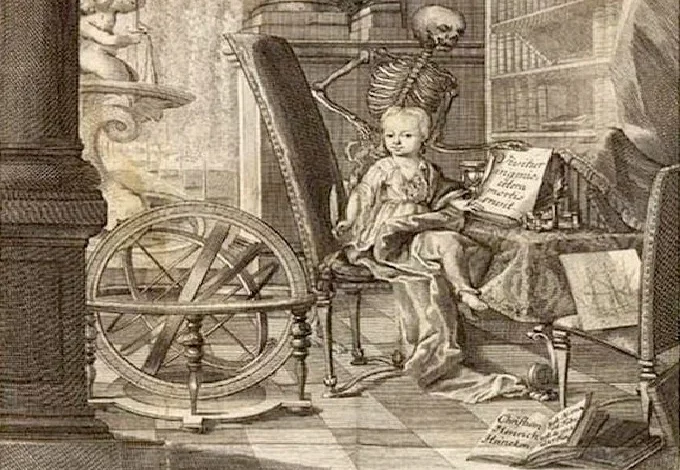Christian Heinrich Heineken – Fate of the most brilliant child in history

Christian Heinrich Heineken, from a small town in northern Germany, went down in history as the most brilliant child ever born on earth. According to legend, he met with the king and spoke several languages fluently but was never able to celebrate his fifth birthday.
IQ Test
If Christian Heinrich Heineken had to take an IQ test today, his score would probably exceed 180. At the same time, he was not autistic. Like a sponge, the kid absorbed knowledge from various fields, not limited to one subject. He was not introverted and communicated well with people, striking them with his conclusions and harmony of speech. By ten months (according to other data, by two months), the baby was not googling like peers but building articulate sentences.
By the year, Christian Heinrich Heineken recited the Biblical Pentateuch by heart. By age two, he had studied world history and listed the most important geographical discoveries without hesitation.
He learned French, became interested in the “dead” language, and mastered Latin. At the age of three, he switched to mathematics and biology, then to religious studies. His favorite reading material was the illustrated encyclopedia in Latin, “Sensual Picture of the World” by Jan Amos Kamensky, which the boy read until late at night. Little fidget liked to talk about the virtues of Rhenish wines or discuss the genealogy of the oldest Germanic surnames.
Christian Heinrich was the second child, while his older brother lived to advanced age and followed in his parent’s footsteps, linking his life with art. The prodigy’s parents were quite ordinary people. My father is an unknown architect and a mediocre artist, and my mother sold art objects in her shop.
The upbringing of the boy was entrusted first to a nurse-nurse – a tough and domineering woman who did not tolerate objections and believed that she knew exactly how to raise children correctly. Her teaching method based on the principle of “what I see, I sing” hardly had an impact on the development of the amazing abilities of the baby.
Woe from wit
The eyes of the students and professors of the Lubeck Gymnasium present opened wide when the three-year-old toddler climbed onto the department.
The kid began his report with a biographical sketch about Roman emperors and Israeli rulers, and then turned the topic toward the unusual geography of his native country and the peculiarities of the human skeleton.
The chains of facts struck with logic while Christian Heinrich Heineken skillfully “juggled” data from different fields of science.
The fame of the unusual boy quickly spread around the neighborhood, so frequent guests of the house (mainly representatives of Bohemia) certainly wanted to see the miracle with their own eyes. Constant visits and “work” in public greatly exhausted the prodigy but added authority and popularity to his parents.
According to the American psychologist Leta Stetter Hollingward, genius children are often simply emotionally unprepared to solve serious philosophical and ethical problems, and this leads to tragedies – from insanity to early death.
A new sensation at court
The bored royal court was glad of a new fun – a little boy who answered the most stupid questions without embarrassment, and surpassed many learned men in the harmony of thoughts.
The boy’s popularity reached the yard, and his parents hardly wanted to miss a unique opportunity to appear in high society.
Despite the fact that Christian’s body had already begun to protest against such heavy loads – the child felt unwell and could hardly take notes – his parents took him to Copenhagen. Throughout the year, the baby had to surprise adult uncles and aunts again and again. One of his first lectures was attended by the king, who called the wonderful child “Miraculum” (translated from Latin “phenomenon, miracle”). The boy passionately dreamed of meeting the main man of the kingdom, with whom the know-it-all planned to share the fruits of his own scientific research. According to one legend, it was the history of Denmark written by him, according to another – navigation maps.
Fatal decision
At home, Christian Heinrich Heineken’s condition began to deteriorate rapidly. He hardly slept and ate poorly, constantly complained of body aches and headaches, was capricious, and asked him to wash and change clothes every hour.
According to modern doctors, the boy could suffer from gluten disease associated with digestive disorders and allergies to proteins contained in cereal grains.
Court doctors recommended a diet that could save the boy’s life: low-fat soups, sugar, and beer. But the mother was so afraid of “upsetting” the nurse, who believed that the best and only food for her pupil was porridge, that she preferred not to change anything. As before, visitors were not refused, and they indulged their curiosity at the bedside of a dying child.
When the child’s body was covered with swelling, he almost stopped getting out of bed. A few days before his death, the kid philosophically pronounced in Latin: “Life is smoke.”
For several weeks, “not indifferent” people flocked from all the surrounding areas to look at the miracle child lying in the coffin for the last time, while the parents carefully wrote down the names of all the influential people who came to the church.
Could the “baby from Lubeck” live a long and happy life? And who is to blame for his early death: the vain parents, the nurse and her views on the diet, nature, which endowed Christian Heinrich Heineken with an excessive thirst for knowledge, which the child’s body simply could not cope with? If he had been born in our time, the tragedy would probably have been avoided, but history, as we know, does not tolerate the subjunctive mood.




